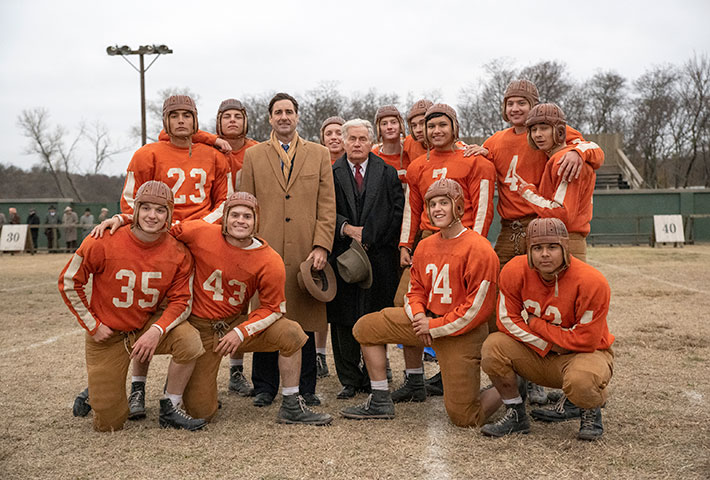 By Jacob Sahms
By Jacob Sahms
From 1927 to 1942, football coach Rusty Russell led the orphans of Fort Worth Masonic Home on to the field against football teams from Class 5 schools, the top high schools in Texas. In 2007, Junction Boys author Jim Dent wrote Twelve Mighty Orphans: The Inspiring True Story of the Mighty Mites Who Ruled Texas Football, sharing how Russell originated the spread offense to neutralize the size and strength of Masonic’s opponents with the speed of the orphans. On June 18, the story gets a cinematic overhaul with top-line billing for Luke Wilson, Martin Sheen, and Robert Duvall. The result is an empowering story of resilience, and a testimony to overcoming life’s trials and tragedies.
Under Ty Roberts’ direction, the cinematic version of 12 Mighty Orphans has all of the earmarks of a solid sports film. With only twelve boys on the football team, playing both ways, Masonic has all of the odds stacked against them. But it’s not just what happens on the field football-wise that’s fantastic: the backstories of the players and coaches shows just how complicated the world of Russell and his orphans was at the time. While the other coaches in the league fight to keep Russell from gaining traction, the football field isn’t Russell’s greatest battlefield.
 Russell’s PTSD from fighting in World War I and his upbringing as an orphan himself provide significant challenges for the coach, but they also prove to make him empathetic for his players in ways that others aren’t. Thanks to the narration by Martin Sheen’s Doc Hall and the dramatic action we see on screen, the audience understands that orphans were treated as secondary citizens, as less than, as people with mental, emotional, or behavioral deficiencies that made them expendable. Russell knows that this isn’t true, because he has overcome these stereotypes to be highly successful. He’s not at Masonic because he’s a bad coach: he sees it as a mission.
Russell’s PTSD from fighting in World War I and his upbringing as an orphan himself provide significant challenges for the coach, but they also prove to make him empathetic for his players in ways that others aren’t. Thanks to the narration by Martin Sheen’s Doc Hall and the dramatic action we see on screen, the audience understands that orphans were treated as secondary citizens, as less than, as people with mental, emotional, or behavioral deficiencies that made them expendable. Russell knows that this isn’t true, because he has overcome these stereotypes to be highly successful. He’s not at Masonic because he’s a bad coach: he sees it as a mission.
 Russell wants to show these orphans that they are mighty warriors, that they are worthy of love, respect, care, and encouragement. He’s not just fighting their individual stories but also the culture, the institution of orphan care, and the weight of years of neglect. [As an aside, the film also shows how much advocates or allies are in terms of overcoming evil within a system.] That makes this more than a football story, because it’s not just about what happens out on the field — it’s about what happens inside the hearts and minds of the players and those around them. It’s what happens when they begin to believe they’re worthwhile and understand that they are mighty warriors.
Russell wants to show these orphans that they are mighty warriors, that they are worthy of love, respect, care, and encouragement. He’s not just fighting their individual stories but also the culture, the institution of orphan care, and the weight of years of neglect. [As an aside, the film also shows how much advocates or allies are in terms of overcoming evil within a system.] That makes this more than a football story, because it’s not just about what happens out on the field — it’s about what happens inside the hearts and minds of the players and those around them. It’s what happens when they begin to believe they’re worthwhile and understand that they are mighty warriors.
In the Old Testament, this plays out over and over again. We can see it in I Samuel 16:7, when God directs the prophet Samuel to anoint the smallest, forgotten son of Jesse: “But the Lord said to Samuel, “Do not consider his appearance or his height, for I have rejected him. The Lord does not look at the things people look at. People look at the outward appearance, but the Lord looks at the heart.” It happens when God calls Gideon in Judges 6, when he instructs Joshua to lead the people after Moses’ death in Joshua 1. And it plays out in the life and teaching of Jesus, who showed how to love, forgive, and overcome, reminding people that God has equipped them for more than they imagine.




